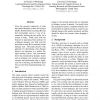Free Online Productivity Tools
i2Speak
i2Symbol
i2OCR
iTex2Img
iWeb2Print
iWeb2Shot
i2Type
iPdf2Split
iPdf2Merge
i2Bopomofo
i2Arabic
i2Style
i2Image
i2PDF
iLatex2Rtf
Sci2ools
133
click to vote
EACL
2006
ACL Anthology
2006
ACL Anthology
Using Reinforcement Learning to Build a Better Model of Dialogue State
Given the growing complexity of tasks that spoken dialogue systems are trying to handle, Reinforcement Learning (RL) has been increasingly used as a way of automatically learning the best policy for a system to make. While most work has focused on generating better policies for a dialogue manager, very little work has been done in using RL to construct a better dialogue state. This paper presents a RL approach for determining what dialogue features are important to a spoken dialogue tutoring system. Our experiments show that incorporating dialogue factors such as dialogue acts, emotion, repeated concepts and performance play a significant role in tutoring and should be taken into account when designing dialogue systems.
Related Content
| Added | 30 Oct 2010 |
| Updated | 30 Oct 2010 |
| Type | Conference |
| Year | 2006 |
| Where | EACL |
| Authors | Joel R. Tetreault, Diane J. Litman |
Comments (0)

